|
|
A child did not pass the newborn hearing screen.
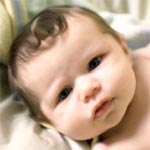 The newborn hearing screen is not a diagnostic evaluation, but it does indicate which babies need more testing. Hearing is critical to a baby's overall development and it is important to help families to complete follow-up screening or testing as soon as possible. The next step that families need to take when a child fails the initial screen depends upon the hospital's hearing screening protocol: The newborn hearing screen is not a diagnostic evaluation, but it does indicate which babies need more testing. Hearing is critical to a baby's overall development and it is important to help families to complete follow-up screening or testing as soon as possible. The next step that families need to take when a child fails the initial screen depends upon the hospital's hearing screening protocol:
- One-step protocol--infants not passing the screening prior to hospital discharge should be referred directly to a pediatric audiologist for further evaluation.
- Two-step protocol--infants not passing the screening prior to hospital discharge should return to the hospital (or a designated location) to receive an outpatient rescreen. The rescreen is usually conducted within two weeks of hospital discharge. Children not passing the rescreen should then be referred to a pediatric audiologist for further evaluation.
Some babies who fail the hearing screen will have normal hearing, but as many as 30% will have a permanent hearing loss. Children not passing the screening need to be referred to an audiologist, so it is important to know which pediatric audiologists in your area have the appropriate equipment and expertise to work with infants and very young children.
Children who are evaluated by a pediatric audiologist and are diagnosed with permanent hearing loss should be:
- Reported to the state's Newborn Hearing Screening (or Early Hearing Detection and Intervention) public health program (mentioned above).
- Referred to the local IDEA Part C early intervention program.
- Referred for further medical and otological evaluations.
- Referred for ophthalmologic, genetic and developmental assessments.
Parents will also need your support in making decisions related to assistive listening devices and communication options.
Learn more about hearing screening and follow-up:
You did not receive newborn hearing screening results for a child.
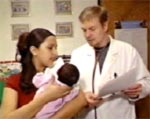 Newborn hearing screening has become the standard of care in most hospitals. Almost all newborns in the U.S. are now screened for hearing loss. Screening programs should send the results of the hearing screen to an infant's primary care provider. Newborn hearing screening has become the standard of care in most hospitals. Almost all newborns in the U.S. are now screened for hearing loss. Screening programs should send the results of the hearing screen to an infant's primary care provider.
If you have not received newborn hearing screening results for an infant or toddler:
- Contact the hospital where the child was born and ask the Newborn Hearing Screening Program Coordinator for a copy of the results and whether any follow-up testing is needed.
- Contact your state's Early Hearing Detection and Intervention Program or call 866-997-HEAR (4327). The Coordinator can tell you whether a child was screened, and, if not, where to refer the family to have a hearing screen done.
Learn more about hearing screening and follow-up:
You want to know more about newborn hearing screening and follow-up.
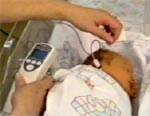 Newborn hearing screening is now the standard of care in the U.S. Almost newborns in the U.S. now receive a physiologic screen for hearing loss prior to hospital discharge. Hearing screening is conducted using otoacoustic emissions (OAE) and/or automated auditory brainstem response (ABR) technology. Hospitals may follow a one- or two-step screening protocol: Newborn hearing screening is now the standard of care in the U.S. Almost newborns in the U.S. now receive a physiologic screen for hearing loss prior to hospital discharge. Hearing screening is conducted using otoacoustic emissions (OAE) and/or automated auditory brainstem response (ABR) technology. Hospitals may follow a one- or two-step screening protocol:
- One-step protocol--infants not passing the screening prior to hospital discharge will be referred directly to a pediatric audiologist for further evaluation.
- Two-step protocol--infants not passing the screening prior to hospital discharge will return to the hospital (or a designated location) to receive an outpatient rescreen. The rescreen is usually conducted within two weeks of hospital discharge. Children not passing the rescreen will then be referred to a pediatric audiologist for further evaluation.
The hearing screen is not a diagnostic evaluation, but it does indicate which babies need more testing. Some babies who fail the hearing screen will have normal hearing, but as many as 30% have a permanent hearing loss. Hearing is critical to a baby's overall development so it is important to help families to complete follow-up screening or testing as soon as possible.
Learn more about hearing screening and follow-up:
A child passed the newborn hearing screening, but there are concerns about hearing or language development
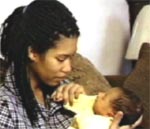 Not all hearing loss can be identified at birth. It is estimated that the incidence of permanent sensorineural hearing loss triples by school age, affecting approximately 3 out of every 300 children. Hearing loss cannot be detected reliably through informal, behavioral observation techniques and yet it dramatically affects a child's development. Although tympanometry and pneumatic otoscopy are used routinely to check for middle ear fluid that can compromise hearing, these tools cannot assess inner ear functioning to screen for permanent sensorineural hearing loss. Not all hearing loss can be identified at birth. It is estimated that the incidence of permanent sensorineural hearing loss triples by school age, affecting approximately 3 out of every 300 children. Hearing loss cannot be detected reliably through informal, behavioral observation techniques and yet it dramatically affects a child's development. Although tympanometry and pneumatic otoscopy are used routinely to check for middle ear fluid that can compromise hearing, these tools cannot assess inner ear functioning to screen for permanent sensorineural hearing loss.
Hand-held otoacoustic emissions (OAE) technology, used widely in newborn hearing screening programs, can also be used by health care providers to conduct periodic screening of young children. It is especially helpful in screening children birth to three years of age who are too young to respond reliably to screening audiometry. If you are not equipped to screen both middle and inner ear functioning, or if concerns persist with children who pass a hearing screen, refer the family to a pediatric audiologist who can perform a full audiologic evaluation. When referring families to an audiologist, it is important to know which pediatric audiologists in your area have the appropriate equipment and expertise to work with infants and very young children.
Learn more about conducting periodic OAE hearing screening with infants and toddlers:
Some health care providers are now conducting hearing screening with infants and toddlers during well-child visits. View or download the training video and guide Early Identification of Hearing Loss: Conducting periodic Otoacoustic Emissions (OAE) hearing screening with infants and toddlers during well-child visits.
Learn more about how to contact a qualified pediatric audiologist in your area:
If you need to find out more about pediatric audiologists serving your area, contact your state's Early Hearing Detection and Intervention Program or call 866-997-HEAR (4327).
Learn more about hearing screening and follow-up:
You want to know more about screening infants and toddlers for permanent hearing loss during well-child visits.
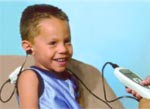 Not all hearing loss can be identified at birth. It is estimated that the incidence of permanent sensorineural hearing loss triples by school age, affecting approximately 3 out of every 300 children. Hearing loss cannot be detected reliably through informal, behavioral observation techniques and yet it dramatically affects a child's development. Although tympanometry and pneumatic otoscopy are used routinely to check for middle ear fluid that can compromise hearing, these tools cannot assess inner ear functioning to screen for permanent sensorineural loss. Not all hearing loss can be identified at birth. It is estimated that the incidence of permanent sensorineural hearing loss triples by school age, affecting approximately 3 out of every 300 children. Hearing loss cannot be detected reliably through informal, behavioral observation techniques and yet it dramatically affects a child's development. Although tympanometry and pneumatic otoscopy are used routinely to check for middle ear fluid that can compromise hearing, these tools cannot assess inner ear functioning to screen for permanent sensorineural loss.
Hand-held otoacoustic emissions (OAE) technology, used widely in newborn hearing screening programs, can also be used by health care providers to conduct periodic screening of young children. It is especially helpful in screening children birth to three years of age who are too young to respond reliably to screening audiometry. It is the most practical method for screening infants and toddlers during well-child visits because it:
- does not require a behavioral response
- can help detect sensorineural hearing loss and call attention to a range of hearing-health concerns
- is quick and painless
- is often a reimbursable procedure
- can be conducted by anyone who is trained to use the equipment and is skilled in working with children
Learn more about conducting periodic OAE hearing screening with infants and toddlers:
Some health care providers are now conducting hearing screening with infants and toddlers during well-child visits. View or download the training video and guide Early Identification of Hearing Loss: Conducting periodic Otoacoustic Emissions (OAE) hearing screening with infants and toddlers during well-child visits.
|



